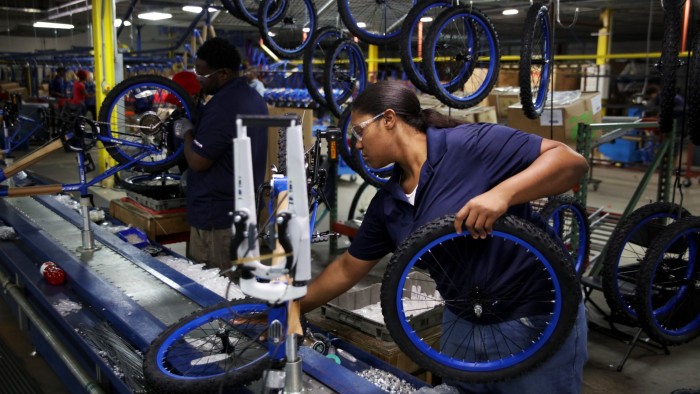Unlock the White House Watch newsletter for free
Your guide to what the 2024 US election means for Washington and the world
US consumers are facing steep price increases on bicycles as Donald Trump’s tariffs take a heavy toll on an industry that’s heavily dependent on Chinese manufacturing.
Arnold Kamler, chair of family-owned Kent International, one of the biggest US bike manufacturers, warned prices across the industry would rise as much as 50 per cent if President Trump retained tariffs at current levels.
US bike brands import about 90 per cent of the roughly 12.5mn bikes they sell annually.
The biggest share is manufactured in China, while Taiwan, Vietnam and Cambodia also produce a substantial amount of bikes.
US President Donald Trump on Wednesday said he was imposing new tariffs of 125 per cent on China. Having previously threatened heavy tariffs on the other big bike manufacturing countries in Asia, he paused them for 90 days on Wednesday.
The tariffs — and threats of them — are hitting the US’s $6bn bike industry at a difficult time. A boom in sales during the pandemic has reversed and inflation has driven up costs for manufacturers.
Kent International’s adult bikes range in price from $149.99 to $524.99. The company has raised prices 12 per cent this year, off the back of Trump’s initial 20 per cent tariff on China.

Kalmer expects to increase prices at least another 25 per cent because of the additional 34 per cent tariff the US president imposed last week.
Trump’s extra 50 per cent tariff on Chinese goods, announced on April 7 in response to retaliatory tariffs from China, “would render my bikes undesirable and too expensive”, Kalmer said, speaking before Trump imposed yet more, higher tariffs on Chinese goods.
Kent International expects to sell 1.4mn bikes in the US this year, which would be its worst performance in over a decade, owing to Trump’s tariffs.
“Our sales have been steadily dropping because of our prices being so high now,” Kalmer said. “There has been no consideration to us despite the hundreds of jobs we have created so far.”
Trump says he is implementing tariffs partly to revitalise US manufacturing.
However, Kamler said that even though Kent International repatriated some assembly from Asia to the US in 2014 — it assembles several hundred thousand bikes annually in its factory in South Carolina — it would still need to raise prices on these bikes because it imports most components from China.
“We’re in quite a quandary now,” Kamler said. “We’ve established a factory [but] we’re paying these very high tariffs, too.”
Kalmer’s complaints echoed those of multiple industry figures, including Taiwan’s Giant Group, one of the biggest suppliers of bikes in the US. The company said tariffs were “absolutely not positive” for the industry and that, if they hold, Giant “will inevitably be forced to reflect the cost”.

Matt Moore, general counsel for PeopleForBikes, an industry lobby group, warned that higher import costs would force many companies either into insolvency or to merge with rivals.
“The mood in the industry is fairly grim because we are facing a potentially existential threat,” Moore said. “Companies with better access to capital and operational advantages will raise prices to cover costs and preserve margins. Companies that cannot do that may succumb to this new trade environment.”
PeopleForBikes is lobbying for relief on duty for imports of frames and other components, and low-interest loans for manufacturers to build factories.
Kamler remained “hopeful” that the Trump administration would reduce the tariffs: “If nothing changes, the only thing that’s going to happen is that bicycle prices will be up 30 to 50 per cent.”


